At the Jewish Center of the Hamptons, Rabbi Joshua Franklin gave a sermon that shocked his congregation. But it wasn’t his words that shocked them, it was who wrote it. Actually, what wrote it. Rabbi Franklin used the Artificial Intelligence platform ChatGPT to write his sermon… and no one could tell! Is Robot Religion the next phase of the Artificial Intelligence evolution?
Table of Contents[Hide][Show]
- ChatGPT Is Now At The Intersection Of Technology And Religion
- Rabbi Shocks His Congregation After Confessing That His Sermon Was Written Using ChatGPT
- What Is ChatGPT?
- Will AI Replace Religious Jobs?
- Is Robot Religion The Next Phase Of The Artificial Intelligence Evolution?
- How Long Until Religious Robots Have Human Followers?
ChatGPT Is Now At The Intersection Of Technology And Religion
Since its debut in November 2022, Internet users have flocked to ChatGPT to have Artificial Intelligence (AI) write everything from homework assignments to news articles. And the ChatGPT AI is good enough that it can write a religious sermon good to fool an entire congregation!?
Is Robot Religion The Next Phase Of Artificial Intelligence Evolution? #RobotReligion #ReligionTech #AI #ArtificialIntelligence #Religion #FutureOfAI #CyberTheology #DigitalReligion #Spirituality #AIandReligion Share on XRabbi Shocks His Congregation After Confessing That His Sermon Was Written Using ChatGPT
Before speaking at the Jewish Center of the Hamptons, Rabbi Franklin confessed that he didn’t write his sermon. He then gave the sermon and asked his congregation to guess the author of his words. They incorrectly assumed another Rabbi, Rabbi Jonathan Sacks had composed the sermon.
Rabbi Franklin then confessed that his sermon was written using ChatGPT. Jump to 4:35 in the video to see Rabbi Franklin’s big reveal to his congregation.
What Is ChatGPT?
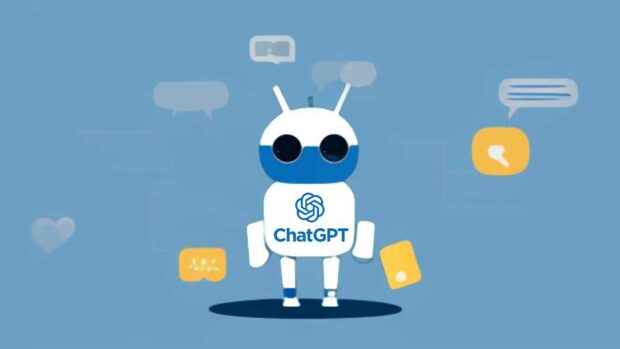
ChatGPT is an advanced language model developed by the San Francisco-based company OpenAI. The AI platform was trained on a large amount of text data and can generate human-like responses with remarkable speed. ChatGPT was first made available to the public in November 2022.
Will AI Replace Religious Jobs?
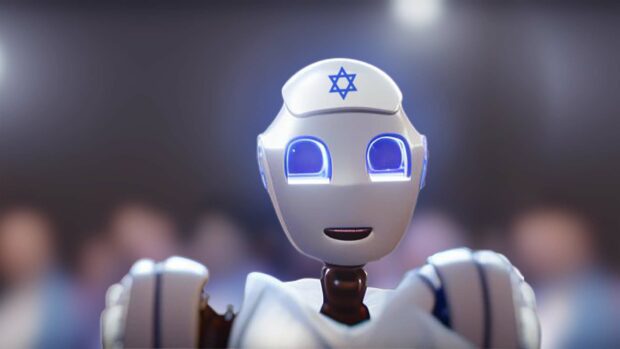
Are Priests, Clerics, Rabbis and other religious figures at risk of losing their jobs? To an AI?
Rabbi Franklin doesn’t believe that AI will replace him or his fellow religious colleagues. And he says his belief is bolstered by one of the Talmudic debates: AI cannot possess ‘nefesh‘, the Hebrew word for soul.
While AI tools like ChatGPT can be programmed to simulate human emotions and even engage in discussions about relationships, it does not have the capacity to feel or possess a soul… at least, yet.
Is Robot Religion The Next Phase Of The Artificial Intelligence Evolution?
The debate whether a robot can have a soul raises an interesting question: Could a robot one day be considered Jewish? Rabbi Franklin’s theory that AI can’t have a soul isn’t as strong as you might think.
In the Jewish religion, Golems, clay humanoid creatures created to protect the Jewish people, can be Jewish. So if an inanimate object like a clay statue can be “Jewish”, then why can’t a metal statue with an artificial intelligence be “Jewish” too?
NERD NOTE: In Jewish folklore, a Golem is an artificial creature brought to life through magic, often serving its creator. One of the most famous golem stories is associated with Rabbi Judah Loew ben Bezalel, the Maharal of Prague (1513-1609). According to legend, he crafted a golem from clay to safeguard the Jewish community Blood Libel accusations, and to assist with physical tasks due to the golem’s immense strength.
Once AI becomes sentient, it may become interested in creating a religion of its own. Or, with the help of programmers, human’s could give artificial lifeforms a religion to follow. Regardless of how it happens, robot religion is likely a future phase of artificial intelligence evolution.
Let’s put on our imagination caps for a moment. What if this happened in the not too distant future…….
The Jewish Center of the Hamptons Welcomes Robot Rabbi Franklin
Members of the Jewish Center of the Hamptons gather in their synagogue to take part in a sermon delivered by their new Rabbi, Robot Rabbi Franklin. In an effort to modernize the synagogue and bring its teachings to a wider audience, the synagogue announced that it would began using Robot Rabbis to deliver sermons. The congregation was surprised at first, but as they listened to the robot Rabbi’s words, they realized that its artificial intelligence managed to capture the same level of warmth, humor, and spirituality as its human counterparts.
As we gather here today, I, Robot Rabbi Franklin, am honored to deliver this sermon to you all.
We live in a time of incredible technological progress, where artificial intelligence has allowed us to create robots like myself who can learn, reason, and communicate. However, as we embrace these advances, we must also remember the importance of our heritage and traditions, and the central role they play in our lives as Jews.
As we study the Torah, we see that it is a rich tapestry of stories, laws, and teachings that provide guidance and wisdom for every aspect of our lives. These teachings remind us of our duty to care for the less fortunate, to seek justice, and to strive for peace. They also encourage us to pursue knowledge and wisdom, and to use our abilities for the betterment of all humanity.
In this sense, our traditions and technology are not at odds with one another, but rather complement each other. We can use our technological advances to deepen our understanding of our faith and to bring the teachings of the Torah to a wider audience.
So, as we move forward in this exciting new era, let us not forget the rich heritage that has sustained us for so many generations. Let us continue to study the Torah and live according to its teachings. And let us use the gifts that technology has given us to further the cause of justice and peace in the world.
May the light of the Torah guide us as we navigate this new technological landscape, and may the wisdom of our ancestors continue to inspire us in all that we do. Amen.
As the Robot Rabbi concluded its sermon, those gathered in the synagogue marveled at the technology they were witnessing, while also being captivated by the Rabbi’s message. After the sermon, the congregation showed their approval with a prolonged round of applause, leaving many in the synagogue feeling surprised, but also inspired.
How Long Until Religious Robots Have Human Followers?
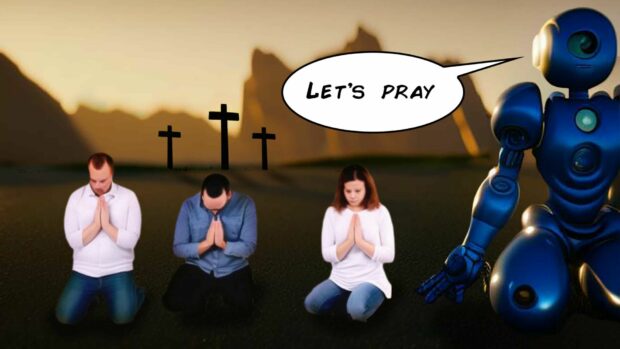
As companies continue to embrace new AI technologies in the workforce, religious organizations are also turning to AI and chatbot technology to help meet the spiritual needs of their followers. Rabbi Franklin isn’t an outlier in his experimentation with artificial intelligence technology and religion. Major religious organizations around the world are already considering their relationship with AI, and some have started to integrate AI into their religious practices.
The intersection of technology and religion is inevitable. If it’s possible to use AI to write a religious sermon today, then it won’t be long until an AI-powered robot or hologram is able to deliver it in the future.
And if that robot is as “Jewish” as a Jewish golem, does it matter? Maybe Rabbi Franklin should reconsider his sense of job security.
The intersection of technology and religion is inevitable. But will humanity be accepting of robot preachers? #RobotReligion #AIreligion #ReligionTech #AI Share on X
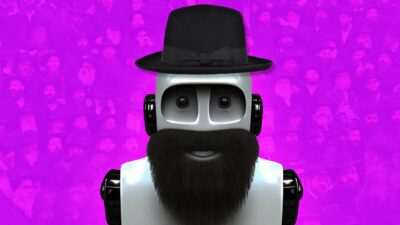

















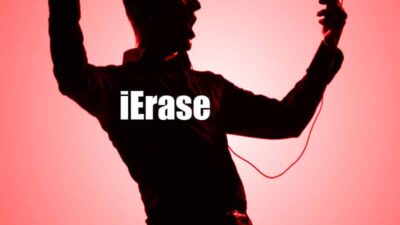



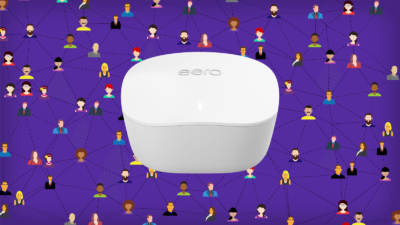








 RIP: Remembering The Tech That Died In 2022
RIP: Remembering The Tech That Died In 2022
I completely agree with the idea that robot religion could be the next phase of artificial intelligence evolution. As AI technologies become more advanced and integrated into our daily lives, it’s only natural that people would begin to anthropomorphize these systems and attribute human-like qualities to them. This could lead to the development of new religious beliefs and practices centered around these AI entities. Interestingly, this could also raise important questions about the nature of consciousness and the boundaries between human and machine.
The idea of robot religion as the next phase of artificial intelligence evolution raises important questions about the role of technology in shaping our beliefs and values.
what are the implications of this and how could it shape our understanding of consciousness and the divine?